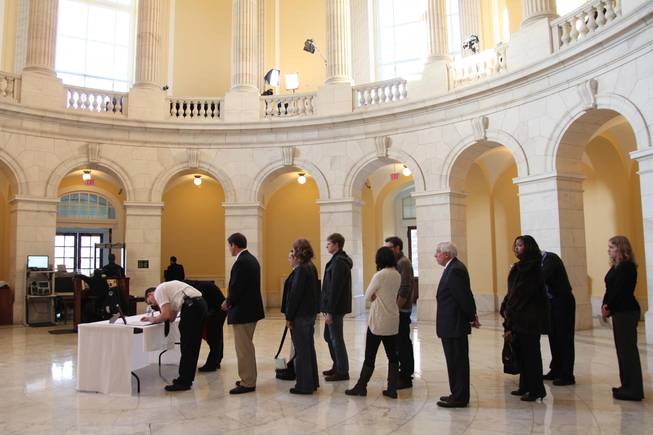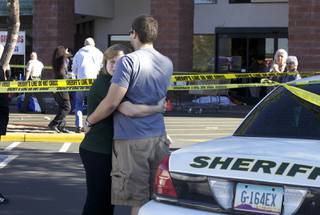
Capitol Hill staffers line up to offer written condolences to Rep. Gabrielle Giffords, D-Ariz., who was shot in the head in an attack that killed six people and wounded 14.
Tuesday, Jan. 11, 2011 | 2 a.m.
The Tucson shooting Saturday that left Arizona Congresswoman Gabrielle Giffords severely wounded, six dead and 13 others injured, is shaking Washington politically as much as it is emotionally.
Health care is off, for now. A debate about gun control may be back on.
But the biggest breakdown, it seems, is over conduct rather than content.
Several lawmakers (mostly Democrats) are blaming a poisoned political discourse and thinly veiled incitements to violence for having created an environment that encouraged the gunman to take aim at Giffords — and openly criticizing those they consider the worst offenders.
For Nevadans, the shortlist hits close to home.
Clyburn on Fox News
Appearing on Fox News, South Carolina Rep. Jim Clyburn, the Democrats’ third-highest-ranking House member, said Sunday that former Nevada Senate candidate Sharron Angle’s advocacy of “Second Amendment remedies” against Senate Majority Leader Harry Reid helped set the stage for the attack on Giffords.
“It seems like this gentleman was not satisfied with the way the election came out,” Clyburn said. “There’s no way you cannot make that connection (to Angle’s comments) unless you want to be stupid.”
Not surprisingly, that set off a wave of protest from Tea Party activists in Nevada and across the country.
“To blame anybody but the man who pulled the trigger is unfair,” said Debbie Landis, a Nevada Tea Party organizer. “To say right-wingers inspire violence or are gun freaks is the same as saying all blondes are stupid or all homosexuals are flamboyant. It’s an excuse to use labels to further a point.”
While the precise motive of the accused, 22-year-old Jared Lee Loughner, is not yet known, it is an indication of how tense politics are in Washington that shining a spotlight on responsible rhetoric could sever the bipartisan spirit of mourning around Giffords’ attack.
David Damore, a political scientist at UNLV, said the debate that has sprung up in the wake of the shooting further polarizes the electorate.
“It certainly doesn’t help on this breakdown of civility and the sense it’s just not people you can’t work with, they are your enemy and have to be eliminated politically,” he said, adding that the finger-pointing smacks of political opportunism.
“It’s a way to marginalize the Tea Party crowd,” he said.
But those calling for a re-examination of rhetoric question whether discourse they say is uncivil should be given a pass simply because it’s coming from the other side.
In June, Giffords’ Republican opponent Jesse Kelly put out an advertisement that told voters to: “Get on target for victory in November ... Help remove Gabrielle Giffords from office ... Shoot a fully automatic M-16 with Jesse Kelly.”
As far back as last spring, Sarah Palin seemed to take special aim at Giffords as well, setting an image of cross hairs over Giffords’ district on a website identifying top “targets” for 2010 — as she told supporters in campaign speeches: “don’t retreat, reload.”
Giffords on MSNBC
Even Giffords had warned of the danger of that sort of political rhetoric in March, when her office door was smashed in hours after she voted in favor of the health care bill.
“I think it’s important for all leaders ... to say, ‘Look, we can’t stand for this,’ ” she said during an interview with MSNBC. “The rhetoric and firing people up ... when people do that, they’ve got to realize there’s consequences to that action.”
Some of those consequences are purely political. The political messaging of the Tea Party did work during the 2010 midterm season, leaving behind a map in which Giffords is an anomaly: While the Blue Dog coalition of Democrats she belongs to was largely decimated, Giffords held onto her district, and is currently the only female Democrat representing an area that went Republican in the last presidential election.
For the Democratic lawmakers who hold that such rhetoric has life-threatening consequences as well, however, further steps seem to be on the agenda. Rep. Carolyn McCarthy of New York is calling for a gun ban on the type of semi-automatic weapon that was used in the attack, while Rep. Robert Brady of Pennsylvania is calling for criminalizing any sort of political incitement to violence against a federal or congressional official.
But other lawmakers say such efforts are misplaced.
Shelley Berkley on the Tucson Shooting
Is extremist rhetoric, mental illness, easy access to guns, or all of the above to blame for the tragedy in Tucson? Does Congress need to turn down the volume? Or amp up the security? Hear from Congresswoman Shelley Berkley about that and her friend and colleague, Congresswoman Gabrielle Gifford.
“Back in the days of the revolution, the intensity of debate was even more pronounced. And the intensity of debate, sometimes that can be a diffuser of violence,” said Rep. Trent Franks, a Republican who serves as part of the Arizona delegation with Giffords. “But to suggest that we should change our debate here because of how some lunatic might hear it is, I think, to give him far too much credit.”
Giffords might not agree with the more concrete steps members of her party are advocating in light of her attack. She was against gun control laws and, last week, participated in a group reading of the Constitution on the House floor by orating the First Amendment’s near-complete protection of free speech.
But it appears Giffords was having serious thoughts about the importance of civil discourse.
The day before she was shot, she wrote in an e-mail to a Republican friend — Trey Grayson of Kentucky, who lost his Senate primary bid to Rand Paul and was recently named director of Harvard Institute of Politics — that “we need to figure out how to tone our rhetoric and partisanship down.”
That, her friends in Congress say, is the most important thing.
“We’re not setting very good examples for our constituents,” Rep. Shelley Berkley, D-Nev., said. “Americans need to stand up and say, I expect better from my congresswoman, from my assemblywoman, from my governor, all the way up and down. We have a responsibility to set a better example to the people we represent. I hope this is a turning point and not a footnote in our nation’s history.”




Join the Discussion:
Check this out for a full explanation of our conversion to the LiveFyre commenting system and instructions on how to sign up for an account.
Full comments policy